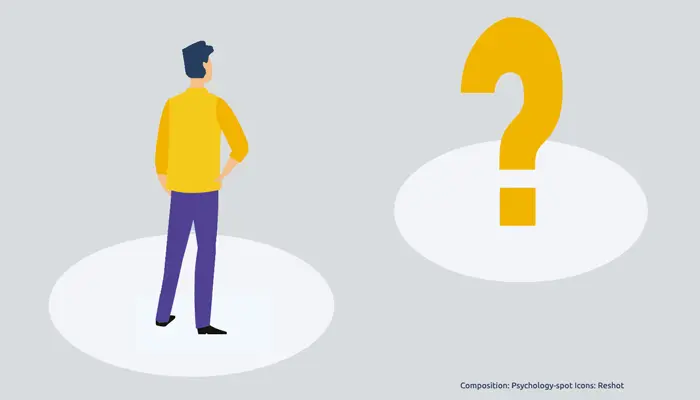
“I just know that I don’t know anything,” said Socrates. And with those words he not only displayed an enormous intellectual humility, but also raised the doubt to a pedestal. Doubt has been and continues to be the companion of great thinkers. Free and transformative thinking is born out of doubt. Only by challenging the most deeply held convictions and beliefs can we go beyond what we take for granted and build something different and our own.
Unfortunately, in these times the doubt is reviled while paying homage to a unique thought that is nourished by immovable truths. However, tackling complex problems armed with absolute certainties or capitalized truths only leads to big mistakes.
Doubting is forbidden: The machine for making certainty
Doubting gets a bad press. Our society does not reward those who doubt and delay. It does not reward those who want to focus, take time to reflect and disagree with what is established to build their own truths and build their life based on them.
Instead, rewards the fastest. The one who applauds and amplifies the official discourse. The one who makes automated decisions without thinking too much because they have convinced us that the most important thing is to keep going. At any cost. Move along. Move along. Move along. No room for doubt and dissension.
In this way, moved by slogans and propaganda – which often sound good, but are lacking in meaning – we rush to judge without knowing the circumstances, much less the motivations. Empathic resonance becomes something rare when we are in a rush to move on and doubt is seen as a waste of time.
Thus, fewer and fewer people are granting the benefit of the doubt. When we live in a society that has become a machine for producing truths through politically correct sentences, but biased and distanced from reality, we become implacable judges who believe they possess a Great Truth. The definitive one!
Practically without realizing it, we expel the different. We ignore what generates doubts. We point the accusatory finger at others without time or desire to delve into their causes and discover the mitigating factors. The guilty verdict is a mere formality, because we don’t need much evidence in a world that rewards speed over reflective pause and is carried away by appearances rather than scrutinizing essence.
However, judging without hesitation and deciding without reflection is the most direct path to mental rigidity and intellectual stagnation. A meaningful life involves doubting, retracing our steps, rethinking our options, reevaluating our beliefs, and changing our opinion once, twice, or as many times as necessary.
I doubt, therefore I exist
“Doubt is the beginning of wisdom,” said Aristotle. From a philosophical point of view, doubting allows us to stop the rush of judgment. It helps us respond rather than just react to circumstances. It encourages us to put ourselves in the place of the other, but it also allows us to take a step back to take a distance from ourselves and not give in to the spontaneity of the first impulse.
“Whoever doubts considers and reconsiders, weighs and re-weighs, discerns and distinguishes”, according to the philosopher Óscar de la Borbolla. Doubt is the conditio sine qua non of a more thoughtful and prudent attitude. Those who doubt leave the inertia of everyday life and the flow of dominant thought to turn their life into a personal choice. In fact, doubting is a lethal weapon against conformity, a balm against irrationality and the best antidote against mental automatisms.
Doubting is a fundamental exercise to find other ways of seeing and understanding the world. Doubt makes us question things, even those that we have always taken for granted. Activates critical thinking. It forces us to question everything. It encourages us not to be satisfied with the first answer or what they tell us.
Doubt also implies the absence of prejudice. It is an opportunity to see things from another point of view, which is not necessarily truer or more false, but just different and more personal. Doubt is what pushes us to question everything and ourselves to give a meaning to what we live, a deeply personal meaning.
To take advantage of the benefit of the doubt, we just have to make sure we don’t get stuck in that shaky balance between yes and no. We need to challenge things, but then we must make decisions and take action. Doubt is not paralyzing, nor does it imply a waste of time if a developmental transformation follows the brooding process.
Stopping to consult, weigh, reflect, doubt at the end of the day, before making a decision does not do any harm, quite the opposite. We need to give ourselves and to the others the benefit of the doubt, instead of diving with our eyes closed in a sea of absolute certainties that turns us into partial judges of the others and of ourselves. Perhaps we should visit more the agora of Ancient Greece, but not in search of answers and truths, but doubts and questions, as the journalist Guillermo Altares said.



